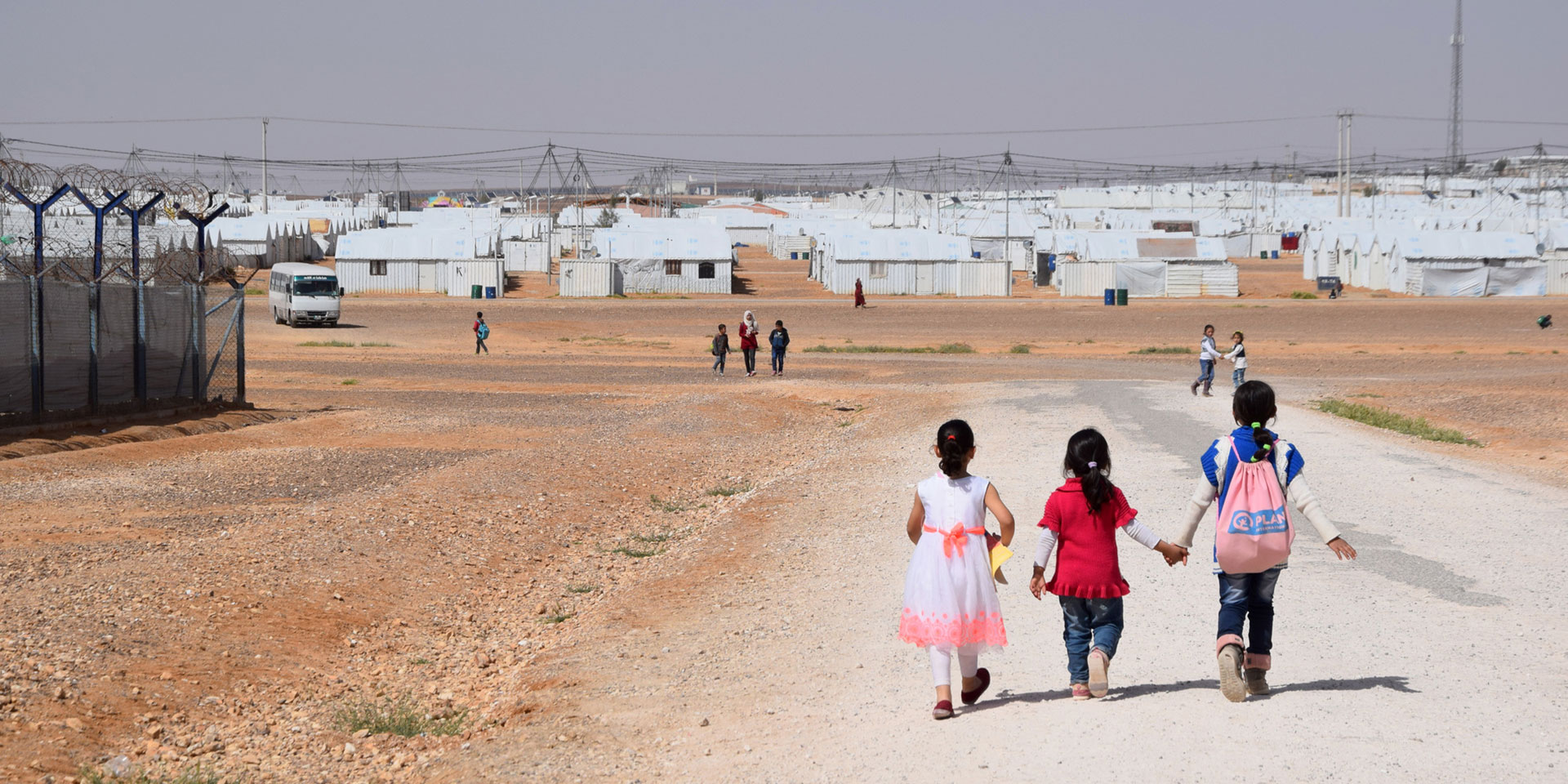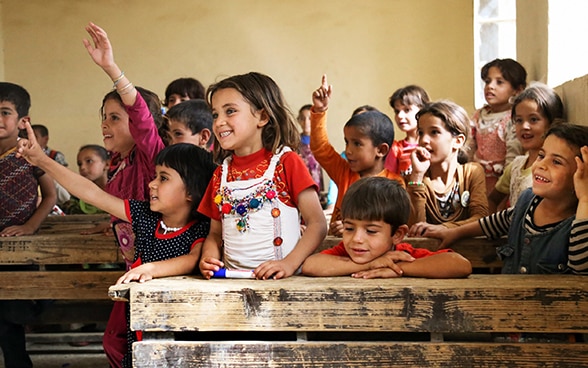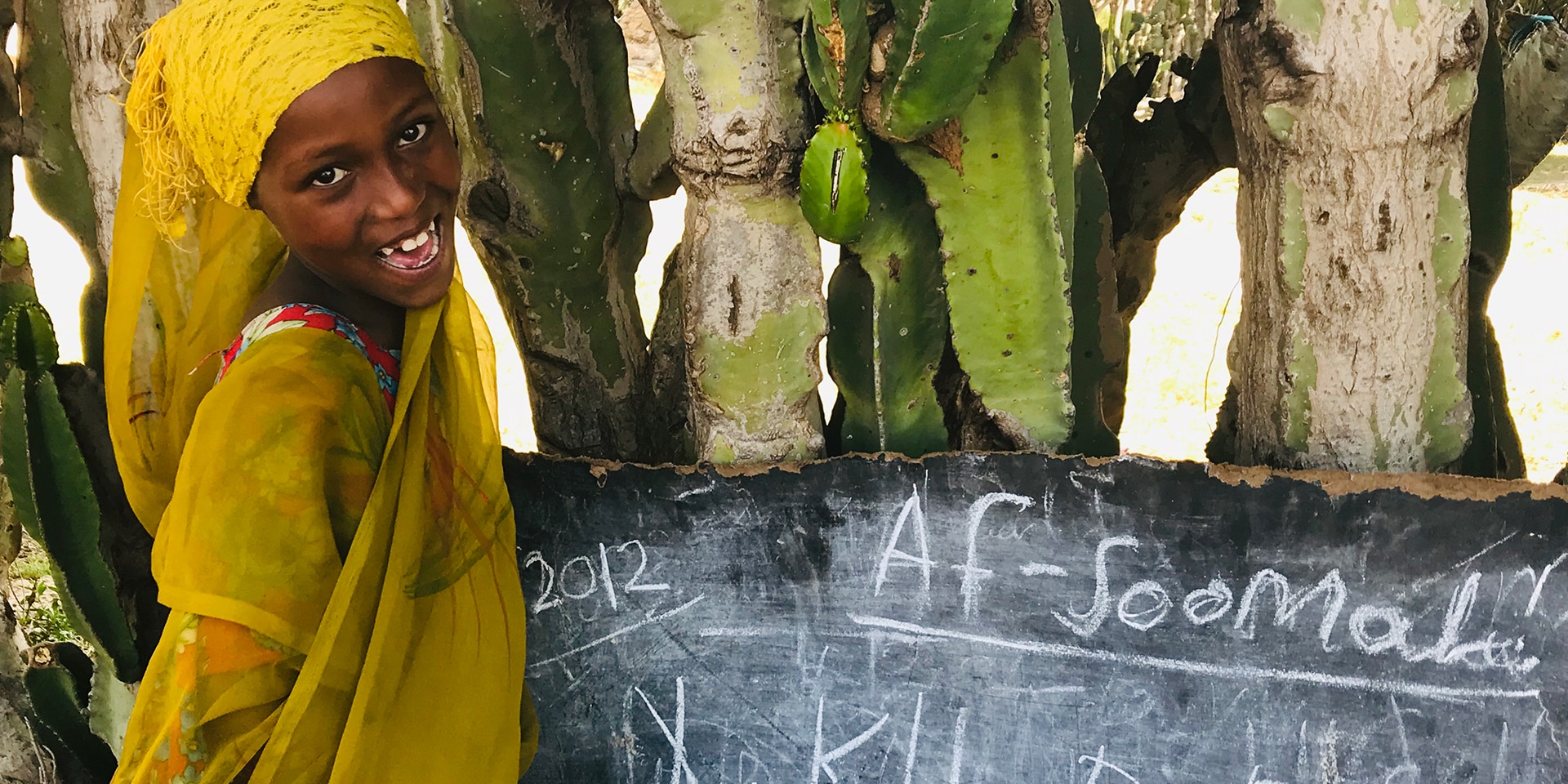Cooperation to bolster children's education in emergencies
The Geneva Global Hub for Education in Emergencies, initiated by Switzerland, was officially launched on 25 January 2021, making International Geneva a global centre for education in emergencies. Over 127 million children in humanitarian crises and conflict regions cannot go to school. More than 40% of the 80 million displaced people are children; the majority of these children have no access to education, resulting in a lack of future prospects. The Hub aims to change this situation.

For the 22,677 Syrian children at the Azraq refugee camp in the Jordanian desert, opportunities to obtain a school-leaving qualification are limited. © Keystone
Azraq – a dusty place in the middle of the Jordanian desert – is a refugee camp resembling many others in the region. According to UN figures, the Syrian civil war, which has been ongoing since 2011, has forced some 13 million people to flee their homes. These people now find themselves huddled together behind barbed wire with few prospects and living in unhygienic conditions. Over 61% (i.e. 22,677) of the 36,874 refugees at Azraq are children, who are among the most vulnerable in crises. Their chances of obtaining a school-leaving qualification are limited. Globally, 48% of refugee children do not attend school. Child labour and child marriage are commonplace. The global picture shows that humanitarian crises, conflicts, migration and displacement hamper access to education for millions of young people. Trapped in hardship and poverty, devoid of protection and prospects, they are at risk of becoming a 'lost generation'. COVID-19 has further exacerbated the situation; around the world, thousands of schools are closed, and many people cannot afford digital tools for distance learning.
The situation continues to escalate
Humanitarian emergencies are on the rise owing to climate change and its consequences; conflicts; and not least COVID-19. Even prior to the pandemic, some 258 million school-aged children and young people worldwide were unable to attend school. The situation is worsening because of COVID-19: the UN estimates that a further 24 million children will not find their way back into schooling due to school closures and precarious economic situations. Progress achieved in recent years in the area of education is being rolled back. Last year, UN Secretary-General António Guterres urged the international community not to neglect education, because otherwise a "generational catastrophe" with lasting social and economic ramifications would ensue. Conflicts, irregular migration and displacement are also increasing. On average, refugee situations last 17 years – an entire childhood. Approximately 127 million of those children without school access live in countries affected by emergency situations. In addition to creating prospects, access to education offers hope and protection to children, who are the most vulnerable in crises. Nevertheless, education is one of the sectors that receives the least recognition and funding in humanitarian disasters.
Switzerland recognised this negative trend; based on its humanitarian tradition and with a particular emphasis on protection and education, it pledged to establish Geneva as a global hub for education in emergencies on the occasion of the 2019 Global Refugee Forum in Geneva.
With regard to education in emergencies, International Geneva has the hitherto untapped potential of a platform that promotes cross-sectoral cooperation with a view to creating opportunities for young people. As a result, the Geneva Global Hub for Education in Emergencies was officially launched on 25 January 2021, as part of the celebrations surrounding the International Day of Education.

Switzerland's successful model
Equal opportunities in education is a concept deeply rooted in Switzerland's core values. Every child has the right to a high-quality education, regardless of their economic, cultural, linguistic or religious background. Compulsory schooling also applies to refugee children and those without established residency status. Historically, compulsory education was used as a means to combat child labour. In Switzerland, compulsory education plays an important role in integration and is key to ensuring social cohesion and future prospects. This model is a factor of success for Switzerland; young talent is fostered and not excluded, ultimately benefiting the Swiss economy too.
The values of equal access to education are reflected in Switzerland's international cooperation. Protecting those particularly disadvantaged by crises, armed conflicts, displacement and irregular migration and ensuring they are provided with quality basic services – in particular the right to education – is one of the four main objectives of the International Cooperation Strategy 2021–24. Education is an investment that pays dividends for individuals as well as for the reconstruction of crisis-hit countries.
Launch of the Geneva Global Hub for Education in Emergencies
Switzerland pledged at the 2019 Global Refugee Forum to promote Geneva as the Global Hub for Education in Emergencies. International Geneva – host to the United Nations Office at Geneva, 38 international organisations, the permanent representations of 177 UN member states, 750 NGOs, and leading academic institutions – offers added value for education in emergency situations. The Geneva Global Hub for Education in Emergencies (a virtual and physical platform) brings together actors who are directly involved in the education sector as well as organisations active in areas such as protection, healthcare, peacebuilding and human rights. This winning combination of thematic expertise has the potential to significantly improve the educational situation of young people affected by crises, conflicts and displacement.
The Hub pursues the following objectives:
- Facilitating inclusive education for children and young people in emergencies by strengthening the cooperation of International Geneva actors.
- Raising awareness among governments and partner organisations to ensure that education is considered one of the highest priorities before, during and after emergencies and protracted crises.
- Improving the effectiveness of operational measures in the area of education in emergencies through better data, innovative research and solutions that provide access to quality education while developing resilient education systems.
Long-term commitment
Humanitarian emergencies often last several years, if not decades. Crises overlap. Droughts or floods come on top of an armed conflict. The approach of the Geneva Global Hub for Education in Emergencies is a step in the right direction. By involving all Geneva actors, a coherent overview can be provided and the appropriate measures can be taken in the crisis region. This is important not only for the children and education systems involved but also for the impact of Switzerland's international cooperation.
In order to secure direct emergency assistance in the long term, Switzerland has adopted an approach that combines emergency humanitarian aid with development cooperation in the education sector. This combination facilitates rapid access to protection and schooling while also helping education authorities to make education systems more resilient to crises. By way of example, in Jordan, the Swiss Agency for Development and Cooperation (SDC) enables Syrian children at the Azraq refugee camp to attend school, catch up on missed lessons in the classroom or via online distance learning, and obtain a school-leaving qualification, which constitutes a springboard to vocational education and training. At the same time, the SDC supports the local authorities in their efforts to improve educational facilities and provide better-quality learning environments for Jordanian and Syrian school children. Thus, refugee children are integrated into communities rather than being sidelined.
International Geneva and education: Swiss foreign policy priorities
The launch of the Geneva Global Hub for Education in Emergencies is in line with Switzerland's foreign policy goals. International Geneva offers the opportunity to draw more attention to education in emergencies. In keeping with its humanitarian tradition, Switzerland takes responsibility for ensuring that the most vulnerable are protected and their fundamental right to education guaranteed. It thereby contributes to local integration, social cohesion, future prospects and prosperity in regions affected by crises.
The International Cooperation Strategy 2021–24, which is derived from the foreign policy strategy, therefore accords great importance to education. Conflicts, natural disasters, displacement and irregular migration are set to rise in the coming years. Protecting the most vulnerable population groups in crisis and displacement contexts and safeguarding the provision of quality basic services – in particular education and healthcare – is one of the four main objectives of the current international cooperation strategy. It is in Switzerland's interests to reduce the causes of displacement and irregular migration and to guarantee quality basic services on the ground. The Geneva Global Hub for Education in Emergencies, whose activities cut across thematic areas, offers the opportunity to bring about change.
Education in emergencies as part of Switzerland's identity
Switzerland has been advocating for the right to education for many years and has enshrined the SDGs on education in its international cooperation strategy. It works in Africa, the Middle East and Asia to protect children affected by conflict, migration and displacement and to provide them with access to quality education. Furthermore, since late 2019 it has been a member of the Executive Committee of Education Cannot Wait, the new fund for education in emergencies that champions the right to education for children affected by humanitarian crises and displacement. Since 2009, it has also been a Board member of the Global Partnership for Education, which helps education ministries in developing countries make sustainable improvements to their education systems. On the occasion of the Global Refugee Forum in December 2019, Switzerland also made an appeal to promote Geneva as a "Global Hub for Education in Emergencies". The following institutions are supporting this appeal: Education Cannot Wait (ECW), the Global Education Cluster (GEC), the Graduate Institute of International and Development Studies (IHEID), the International Committee of the Red Cross (ICRC), the Inter-agency Network for Education in Emergencies (INEE), the United Nations Children's Fund (UNICEF), the Office of the United Nations High Commissioner for Refugees (UNHCR), the United Nations Educational, Scientific and Cultural Organization (UNESCO) and the University of Geneva.


.jpg)